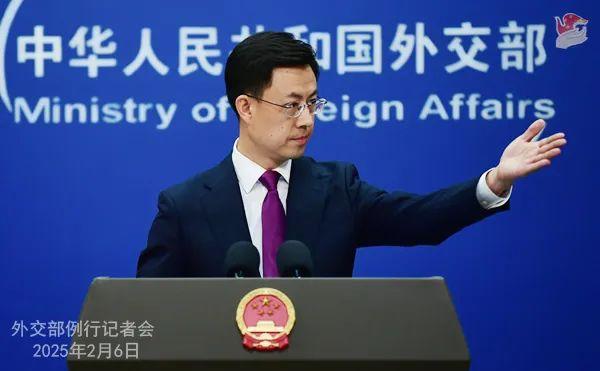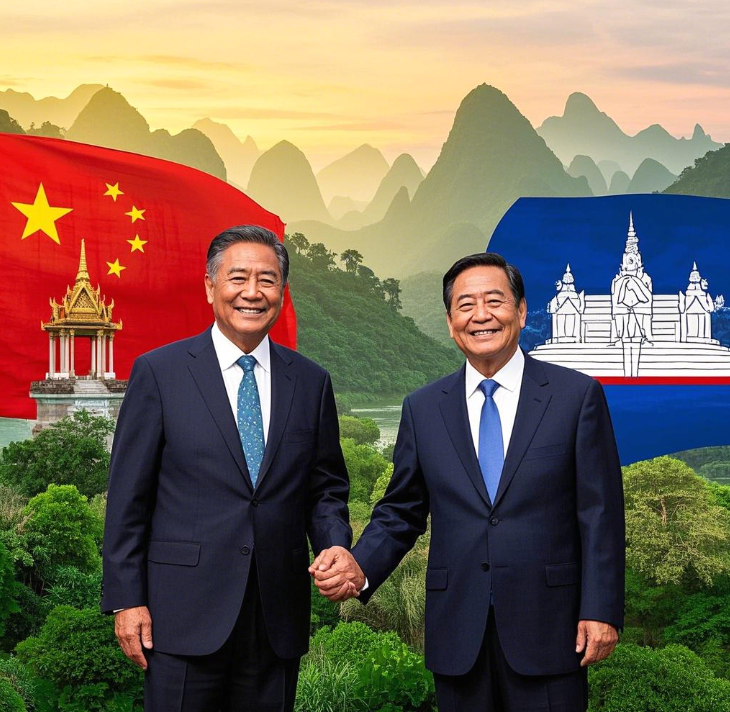Eric's Insight: Where is rumor on China-Cambodia ties from
A handful of we-media accounts recently posted groundless remarks that Cambodian leaders are choosing sides between China and the U.S. and that major cooperation projects between China and Cambodia are stalling. So where and why, you may wonder, do the rumors on China-Cambodia ties originate?

Foreign Ministry Spokesperson Guo Jiakun hosts a regular press conference on February 6.
At a regular press conference on February 6, Chinese Foreign Ministry Spokesperson Guo Jiakun said these remarks on Cambodia are purely groundless smears and deliberate vilification. On February 8, the Chinese Embassy in Cambodia posted an article on the rumors and truth about Sino-Cambodian relations, listing two WeChat articles as rumors.
The first article is titled “Has Cambodia changed its mind and slipped away from China?”, while the title of the second article has disappeared. Posted on February 6 in Guangdong, the first article mentioned a recent “World Multi-Party Cooperation Conference held in Moscow”, but when the event name is typed into the internet search engines, none of the English and Chinese results is relevant. This shows the conference is not existed at all.
A further check-up shows the article has been viewed by 30,000, and it is posted on a WeChat account with its IP address belonging to Canada. Another article with similar title and content was posted much earlier on February 2 in Hebei, but it has been viewed by 13,000 only. Here, it’s queer that one WeChat article originating in Canada went viral among Chinese audience much faster than the other with the similar title and rumor in China. This is against the law of communication.

The China-Cambodia friendship. AI photo
A possible explanation is that the article from Canada has been a piece of fake news that is paid and promoted among Chinese audience via the WeChat platform. So who has the motivation to pay for the smears on China-Cambodia ties? It is the western powers that have been “concerned” about the Chinese influence in Cambodia.
As early as November 2024, the UK-based news agency Reuters published an article titled “Cambodia's flagship canal in hot water as China funding dries up”, and more recently on January 30, the UK-based magazine The Economist posted another article called “Is Cambodia slipping out of China’s orbit?”. Although both articles didn’t mention the “World Multi-Party Conference in Moscow”, the general message of the two UK articles are the same as that of the said Canadian article.
Shortly after the Canadian rumor went viral on WeChat on February 6, the China Global South Project (CGSP) website posted another article titled “Cambodia and China: Is the Ironclad Friendship Starting to Rust?” on February 7. Again, the general tone is the same as that of the UK and Canadian articles.

The Funan Techo Canal. AI photo
The website introduction says that “CGSP is a non-profit independent multimedia organization dedicated to exploring every aspect of China’s engagement with the Global South. It is registered as a not-for-profit corporation in the United States.” Everything is clear so far: The rumor on China-Cambodia ties is fake news from western powers who are really “concerned” about China’s influence in Cambodia.
Though the articles are posted on different platforms in different countries and in different languages, the general message remains the same and they are trying to echo each other, with the same purpose to smear the solid China-Cambodia relations. Behind the seemingly scattered pieces of fake news, there is a certain operator to set the agenda.
Actually, the China-Cambodia relations remain ironclad as ever, and it is doomed to be in vain to vilify true friendship between countries. “At present, China and Cambodia are guiding the high-quality development of bilateral relations with high-level mutual trust, continuing to enrich the Diamond Hexagon cooperation framework and providing more certainty to address international challenges,” said Guo.
Writing by Wang Shixue; Proofreading by Wang Huan